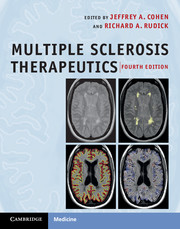Book contents
- Multiple Sclerosis Therapeutics
- Multiple Sclerosis Therapeutics
- Copyright page
- Contents
- Contributors
- Abbreviations list
- Foreword
- Preface
- Section I Introduction
- Section II Clinical trial methodology
- 6 Measures of neurological impairment and disability in multiple sclerosis
- 7 Assessment of neuropsychological function in multiple sclerosis
- 8 Health-related quality of life assessment in multiple sclerosis
- 9 Measures of acute and chronic lesions visualized by conventional magnetic resonance imaging
- 10 Measures of magnetization transfer
- 11 Measurement of CNS atrophy
- 12 Axonal pathology in patients with multiple sclerosis
- 13 Imaging of gray matter lesions in multiple sclerosis
- 14 Functional imaging in multiple sclerosis
- 15 Diffusion imaging in multiple sclerosis
- 16 The use of MRI in multiple sclerosis clinical trials
- 17 Optical coherence tomography to monitor axonal and neuronal integrity in multiple sclerosis
- 18 The process of drug development and approval in the United States, the European Union, and Asia
- 19 Selection, interpretation, and development of end-points for multiple sclerosis clinical trials
- 20 The challenge of demonstrating long-term benefit of disease-modifying therapies in multiple sclerosis
- 21 The growing need for alternative clinical trial designs for multiple sclerosis
- 22 Ethical considerations in multiple sclerosis clinical trials
- 23 Pharmacogenomics and related discovery-driven approaches in multiple sclerosis
- 24 Neutralizing antibodies directed against biologic agents to treat multiple sclerosis
- Section III Clinical trials of multiple sclerosis therapies
- Section IV Therapy in clinical practice
- Index
- Plate Section
21 - The growing need for alternative clinical trial designs for multiple sclerosis
from Section II - Clinical trial methodology
Published online by Cambridge University Press: 05 December 2011
- Multiple Sclerosis Therapeutics
- Multiple Sclerosis Therapeutics
- Copyright page
- Contents
- Contributors
- Abbreviations list
- Foreword
- Preface
- Section I Introduction
- Section II Clinical trial methodology
- 6 Measures of neurological impairment and disability in multiple sclerosis
- 7 Assessment of neuropsychological function in multiple sclerosis
- 8 Health-related quality of life assessment in multiple sclerosis
- 9 Measures of acute and chronic lesions visualized by conventional magnetic resonance imaging
- 10 Measures of magnetization transfer
- 11 Measurement of CNS atrophy
- 12 Axonal pathology in patients with multiple sclerosis
- 13 Imaging of gray matter lesions in multiple sclerosis
- 14 Functional imaging in multiple sclerosis
- 15 Diffusion imaging in multiple sclerosis
- 16 The use of MRI in multiple sclerosis clinical trials
- 17 Optical coherence tomography to monitor axonal and neuronal integrity in multiple sclerosis
- 18 The process of drug development and approval in the United States, the European Union, and Asia
- 19 Selection, interpretation, and development of end-points for multiple sclerosis clinical trials
- 20 The challenge of demonstrating long-term benefit of disease-modifying therapies in multiple sclerosis
- 21 The growing need for alternative clinical trial designs for multiple sclerosis
- 22 Ethical considerations in multiple sclerosis clinical trials
- 23 Pharmacogenomics and related discovery-driven approaches in multiple sclerosis
- 24 Neutralizing antibodies directed against biologic agents to treat multiple sclerosis
- Section III Clinical trials of multiple sclerosis therapies
- Section IV Therapy in clinical practice
- Index
- Plate Section
Summary
Keywords
- Type
- Chapter
- Information
- Multiple Sclerosis Therapeutics , pp. 253 - 260Publisher: Cambridge University PressPrint publication year: 2011
- 2
- Cited by



